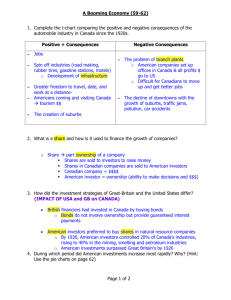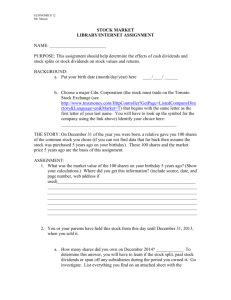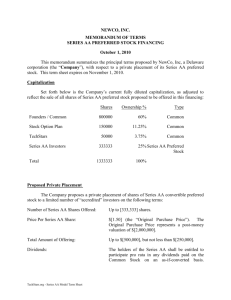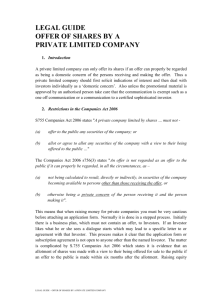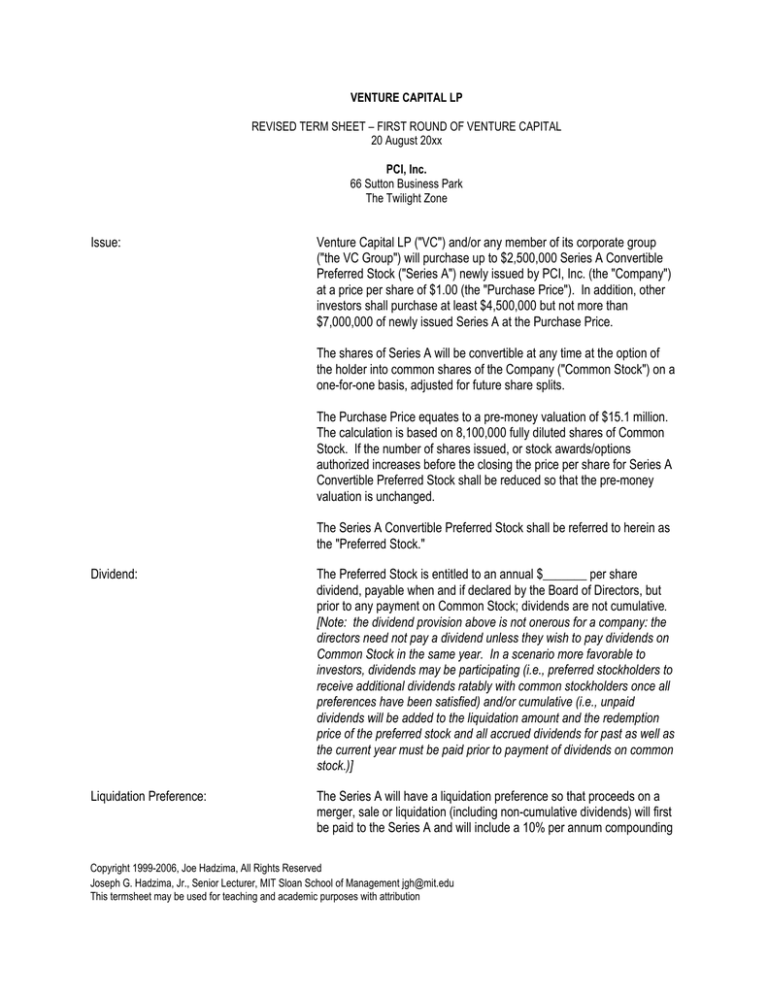
VENTURE CAPITAL LP
REVISED TERM SHEET – FIRST ROUND OF VENTURE CAPITAL
20 August 20xx
PCI, Inc.
66 Sutton Business Park
The Twilight Zone
Issue:
Venture Capital LP ("VC") and/or any member of its corporate group
("the VC Group") will purchase up to $2,500,000 Series A Convertible
Preferred Stock ("Series A") newly issued by PCI, Inc. (the "Company")
at a price per share of $1.00 (the "Purchase Price"). In addition, other
investors shall purchase at least $4,500,000 but not more than
$7,000,000 of newly issued Series A at the Purchase Price.
The shares of Series A will be convertible at any time at the option of
the holder into common shares of the Company ("Common Stock") on a
one-for-one basis, adjusted for future share splits.
The Purchase Price equates to a pre-money valuation of $15.1 million.
The calculation is based on 8,100,000 fully diluted shares of Common
Stock. If the number of shares issued, or stock awards/options
authorized increases before the closing the price per share for Series A
Convertible Preferred Stock shall be reduced so that the pre-money
valuation is unchanged.
The Series A Convertible Preferred Stock shall be referred to herein as
the "Preferred Stock."
Dividend:
The Preferred Stock is entitled to an annual $_______ per share
dividend, payable when and if declared by the Board of Directors, but
prior to any payment on Common Stock; dividends are not cumulative.
[Note: the dividend provision above is not onerous for a company: the
directors need not pay a dividend unless they wish to pay dividends on
Common Stock in the same year. In a scenario more favorable to
investors, dividends may be participating (i.e., preferred stockholders to
receive additional dividends ratably with common stockholders once all
preferences have been satisfied) and/or cumulative (i.e., unpaid
dividends will be added to the liquidation amount and the redemption
price of the preferred stock and all accrued dividends for past as well as
the current year must be paid prior to payment of dividends on common
stock.)]
Liquidation Preference:
The Series A will have a liquidation preference so that proceeds on a
merger, sale or liquidation (including non-cumulative dividends) will first
be paid to the Series A and will include a 10% per annum compounding
Copyright 1999-2006, Joe Hadzima, All Rights Reserved
Joseph G. Hadzima, Jr., Senior Lecturer, MIT Sloan School of Management jgh@mit.edu
This termsheet may be used for teaching and academic purposes with attribution
Venture Capital LP Termsheet
Page 2
guaranteed return calculated on the total amount invested. Upon
completion of an additional round of funding of at least $3,000,000 the
compounding guaranteed return feature will expire. The liquidation
preference will cease to operate if the proceeds due to Series A, on a
merger, sale or liquidation on an as-converted basis, exceed the
proceeds that would be due under the liquidation preference.
[Alternatively, terms may be structured so that preferred stockholders
may get back only their original investment or they may retain their
original investment plus all accrued but unpaid dividends for every years
(see "cumulative dividends" in Section 2 above) or they may share the
remainder ratably on an as-converted basis with common stockholders
only after their preferences and all common stock liquidation amounts
have been paid. (2) In subsequent financings, new series of preferred
stock may have a superior position on liquidation or be on a pari passu
footing with this series with respect to liquidation. (3) Liquidation may
be defined in the term sheet to include acquisition of the Company or its
merger into another entity, with the classification of such event as a
liquidation or not at the investors' option at time of the merger.]
Use of Proceeds:
The funds raised by Series A will be used principally for general working
capital purposes.
Voting Rights:
The holders of the Series A shall have the right to vote with the
Common Stock on an as-if-converted basis.
Redemption:
If not previously converted, the Series A is to be redeemed in three
equal successive annual installments beginning January 20, 2005.
Redemption will be at the purchase price plus a 10% per annum
cumulative guaranteed return. [Note: While going public or an
acquisition usually connote a clear "success’, the investor must also
consider the case in which the Company only achieves moderate
success and management is content to keep things going as a private
Company. According to these terms, the company must redeem at a
specified amount which provides investors with some guaranteed return
on their investment. Alternatives include: (a) a provision stating that
the Company may not call the Preferred Stock for redemption nor may
the investors require the Company to redeem their stock and (b)
optional redemption after a certain date by either the Company or the
investors. If the Company may call the Preferred Stock at its option, it
could potentially call once the common price exceeds the redemption
price and force the investor to take a mediocre repayment on his
investment or convert to common and lose his preferred position in the
Company.]
Registration Rights:
Two U.S. demand registrations, subject to $3 million and 500,000 share
Copyright 1999-2006, Joe Hadzima, All Rights Reserved
Joseph G. Hadzima, Jr., Senior Lecturer, MIT Sloan School of Management jgh@mit.edu
This termsheet may be used for teaching and academic purposes with attribution
Venture Capital LP Termsheet
Page 3
trigger, unlimited piggybacks, and evergreen S-3 if requested and
possible all at company expense. [In order to have a public offering the
Company must file a registration statement with the Securities and
Exchange Commission. Because the investor can not be assured of
controlling the Board of Directors of the Company (after all that is what
the entrepreneur fears will happen), the investor usually negotiates for
"demand registration rights" under which the Company contractually
agrees to file a registration statement on the demand of the investor.
The number of "demands" is negotiated, with the Company saying that
one is enough and the investor arguing for two or more. Conceptually
the granting of demand registration rights is a big deal for the Company
because of the time and cost involved if those rights are invoked- it can
easily cost $200,000 or more to file a registration statement. In reality, it
is a rare case when registration is demanded against the desires of
management- after all management has to go on the "road show" and
make a good presentation to the mutual fund managers and brokers
who will be buying the stock. In addition, the investor usually receives
"piggyback" registration rights under which the investor’s shares are
included in any "primary registration" statement (where the company is
selling its own stock) or in any "secondary registration" where the
Company is filing a registration statement to permit others to sell.]
Pre-emptive Rights:
Holders of the Preferred Stock will be granted rights to participate in
future equity financings of the Company based upon their pro-rata, as-ifconverted, ownership of the Company. [Note: This right is typically
granted to investors to ensure that the Company does not negotiate
new financings with new players without offering to deal with the present
investors. Sometimes investors are required to take "all or none" of the
new financing.]
Automatic Conversion:
The Preferred Stock shall be automatically converted into Common
Stock at the then applicable conversion rate (1:1 assuming no share
splits) in the event of an underwritten public offering of shares of the
Company at a total offering of not less than $20,000,000 and at a per
share public offering price of not less than three times the Series A
purchase price per share, adjusted for splits. [Because the control and
others terms of a venture capital preferred are not consistent with public
market securities, the Preferred Stock has to “disappear” (i.e., be
converted into Common Stock) at the Initial Public Offering]
Anti-Dilution:
Series A shall have weighted average anti-dilution, based on a weighted
average formula to be agreed, for all securities purchased as part of this
transaction (excluding shares, options and warrants issued for
Copyright 1999-2006, Joe Hadzima, All Rights Reserved
Joseph G. Hadzima, Jr., Senior Lecturer, MIT Sloan School of Management jgh@mit.edu
This termsheet may be used for teaching and academic purposes with attribution
Venture Capital LP Termsheet
Page 4
management incentive and small issues for strategic purposes of under
100,000 shares). [Note: Antidilution adjustments increase the amount
of stock received by an investor if the Company issues additional stock
at prices which are lower than that paid by the investor. Because there
is no readily ascertainable independent market price for the stock,
investors believe that they should be protected against having overpaid.
Another rationale is that the entrepreneur should pay if he does not
increase the value of the Company by the next round of financing.
However, from the entrepreneur's side a decrease in the value of the
Company could result from events beyond the entrepreneur's controle.g. a stock market crash or a change in the law. Having said this,
antidilution adjustments are almost always present in one form or
another.
Note that the formulae used in these provisions decrease the
conversion price of the Preferred Stock resulting in more shares of
common stock per share of Preferred Stock upon conversion. The
weighted average antidilution formula considers the total number of
shares being issued as well as the per share price; contract this to the
full rachet antidilution formula which automatically reduces the
conversion price to the price at which a new issued is sold, even if only
a small number of shares are issued.]
Management Options:
Simultaneously with this transaction, one million new shares shall
expand the Company's management incentive stock option pool bringing the total number of shares issued and stock incentives (awards
and options) authorized to 6,100,000. [Note: investors usually factor
the option pool size into their valuation of the Company and assume
that the full amount of the option pool is taken into account in
determining the “pre-money” valuation of the Company.]
Rights of First Offer; Tag-Along:
The Company and the Investors will have a right of first refusal with
respect to any employee's shares proposed to be resold. Alternatively,
the Investors will have the right to participate in the sale of any such
shares to a third party (co-sale rights), which rights will terminate upon a
public offering.
Information Rights:
Monthly actual vs. plan and prior year. Annual budget 60 days before
beginning of fiscal year. Annual audit by national firm. All recipients of
financial statements to execute non-disclosure agreement acceptable to
Company counsel. The aforementioned information rights shall be
available to each holder of Preferred Stock for as long as such holder
owns 220,000 shares of Preferred Stock or shares of Common Stock
issued upon conversion of shares of Preferred Stock.
Copyright 1999-2006, Joe Hadzima, All Rights Reserved
Joseph G. Hadzima, Jr., Senior Lecturer, MIT Sloan School of Management jgh@mit.edu
This termsheet may be used for teaching and academic purposes with attribution
Venture Capital LP Termsheet
Page 5
Negative Covenants:
Approval by holders of Preferred Stock of organic changes outside
normal course of business and sale, liquidation or merger, increase in
board seats or change election procedures, new shares senior to or on
par with and all distributions (dividends, repurchases).
Board of Directors:
The Board will consist of ___ members. The holders of the Preferred
Stock will have the right to designate __ directors, the holders of the
Common (exclusive of the Investors) will have the right to designate ___
directors, and the remaining ___ directors will be unaffiliated persons
elected by the Common Stock and the Preferred Stock voting as a
single class.
Stock Restriction Agreement:
All present holders of Common Stock of the Company who are
employees of, or consultants to, the Company will execute a Stock
Restriction Agreement with the Company pursuant to which the
Company will have an option to buy back at cost a portion of the shares
of Common stock held by such person in the event that such
stockholder's employment with the Company is terminated prior to the
date of employment. 25% of the shares will be released each year from
the repurchase option based upon continued employment by the
Company. [Investors will want to ensure that the present management
of the Company has an incentive to remain there; rewarding continued
work at the Company by appreciation in the value of stock and
discouraging the individual's leaving by the buy-back provisions detailed
above are effective mechanisms to encourage long-term commitment.]
Non-competition, Proprietary
Information and Inventions
Agreement:
Each officer and key employee of the Company designated by the
Investors will enter into a non-competition, proprietary information and
inventions agreement in a form reasonably acceptable to the Investors.
Expenses:
The Company shall pay the reasonable expenses of legal counsel to
represent the Investors in the completion of the Preferred Stock
Agreement and the completion of all due diligence, up to a maximum of
$_________.
Definitive Purchase Agreement and
Due Diligence:
The purchase of the Series A will be made pursuant to negotiation of a
definitive Series A purchase agreement. Additionally, the closing of this
investment will be contingent on the satisfactory completion of VC's due
diligence reviews and final investment committee approvals. Such due
diligence reviews will include, but not be limited to, a professional review of
all legal and financial contracts of the Company.
Closing:
The Company and VC agree to use their best efforts to close the
Copyright 1999-2006, Joe Hadzima, All Rights Reserved
Joseph G. Hadzima, Jr., Senior Lecturer, MIT Sloan School of Management jgh@mit.edu
This termsheet may be used for teaching and academic purposes with attribution
Venture Capital LP Termsheet
Page 6
transaction on or about February 11, 20xx. It is agreeable to have a first
closing of the transaction for $7,000,000 of Series A and leave the
transaction open for an additional 60 days post first closing to close up to
$10,000,000 of total Series A.
Other than that the Company hereby agrees to pay Investors' reasonable legal fees of up to $25,000 in case a definitive agreement
is not ultimately reached with VC (which agreement is legally binding) the undersigned acknowledge that this term sheet does not
constitute a binding agreement, but expresses an agreement in principle covering the principal terms of an equity financing, and an
undertaking to proceed in good faith to negotiate a definitive agreement.
This proposal remains open until 5:30 pm on the tenth day following the date of this termsheet, at which point it will be deemed to
have been withdrawn.
AGREED AND ACCEPTED:
PCI, Inc.
By: ________________________________
Date: ______________________________
Venture Capital LP
By: ________________________________
Date: ______________________________
Copyright 1999-2006, Joe Hadzima, All Rights Reserved
Joseph G. Hadzima, Jr., Senior Lecturer, MIT Sloan School of Management jgh@mit.edu
This termsheet may be used for teaching and academic purposes with attribution

